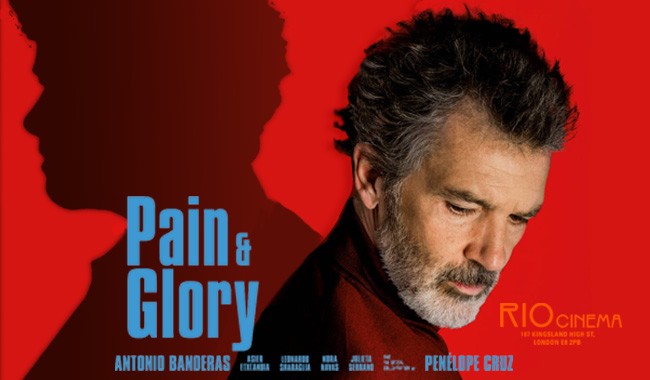Susan Granger’s review of “Pain and Glory” (Sony Pictures Classics)
This bittersweet, thinly veiled, semi-autobiographical drama from Pedro Almodovar revolves around a fictional Spanish filmmaker, Salvador Mello (Antonio Bandaras), who contemplates how much fire he still has in his belly while awaiting the re-release of one of his older films.
“Without filming, my life is meaningless,” he declares.
Living alone in a tastefully appointed house in Madrid, melancholic Mallo suffers from an assortment of ailments (asthma, sciatica, tinnitus), primarily headaches, stemming from fused vertebrae and coupled with depression. A multitude of memories appear through a variety of flashbacks.
There’s poverty-plagued young Salvador (Asier Flores) accompanying his mother Jacinta (Penelope Cruz) to the stream, where she and her friends sing as they do laundry in a bucolic scene near the caves of Paterna.
Growing up, Salvador becomes a church choirboy and experiences a sexual awakening watching bricklayer Eduardo (Cesar Vicente) washing his muscled body.
Much later, when she visits him, elderly Jacinta (Jacina Serrano) chides Salvador: “You haven’t been a good son.”
Prompted by an upcoming Spanish Cinematheque celebration, reclusive Salvador tracks down Alberto (Asier Etxeandia), an actor to whom he hasn’t spoken in 30 years. Debauched Alberto introduces Salvador to smoking heroin to ease his pain.
When Alberto discovers one of Salvador’s pieces from the past, he insists on performing it as a monologue in a Madrid theater before an audience that includes Federico (Leonardo Sbaraglia), who had an affair with Salvador many years earlier
That leads to one of the most memorable scenes: a poignant conversation between these two late middle-aged men about their sublimated desires.
Almodovar views this episodic, visually compelling confessional as completing a trilogy that started with “Law of Desire” and continued with “Bad Education.” And Antonio Banderas delivers a magnificent performance as his alter-ego.
In Spanish with English subtitles, on the Granger Movie Gauge of 1 to 10, “Pain and Glory” is a structured, sublimely stylized 7, cinematically summarizing Pedro Almodovar’s life and work.

